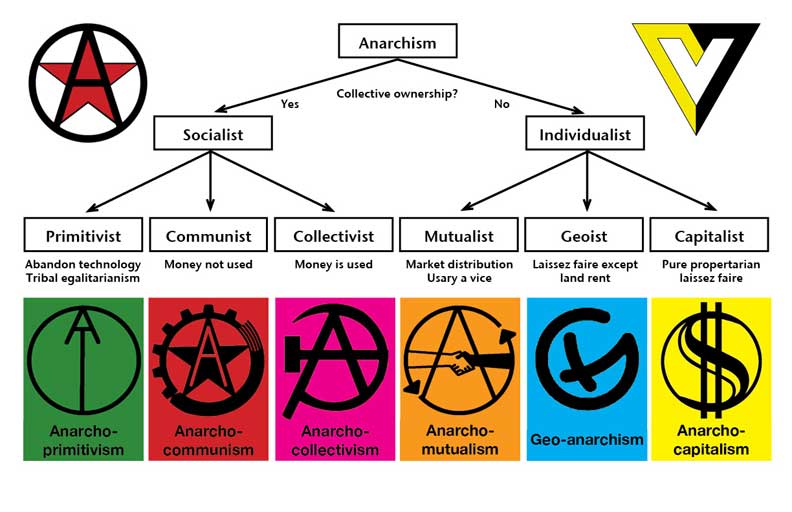November 20, 2017
Is Sectarianism a Problem?
There are a significant number of anarchists who hold a narrow view of what anarchism is, defining it in such a way to disqualify other anti-state ideologies. Some try to justify this historically - but in this case only mutualists are “true” anarchists. Others say only “movement” anarchism counts, and ideologies don’t. There are many ad hoc excuses for counting out a school of anarchism one scorns.
This is not a new phenomena which started with the internet and social media. In the 19th century Voltairine de Cleyre experienced the same silly squabbles.
“There are, accordingly, several economic schools among Anarchists; there are Anarchist Individualists [anarcho-capitalists], Anarchist Mutualists, Anarchist Communists and Anarchist Socialists. In times past these several schools have bitterly denounced each other and mutually refused to recognize each other as Anarchists at all. The more narrow-minded on both sides still do so; true, they do not consider it narrow-mindedness, but simply a firm and solid grasp of the truth, which does not permit of tolerance towards error. This has been the attitude of the bigot in all ages, and Anarchism no more than any other new doctrine has escaped its bigots. Each of these fanatical adherents of either collectivism or individualism believes that no Anarchism is possible without that particular economic system as its guarantee, and is of course thoroughly justified from his own standpoint.” - Anarchism, Voltairine de Cleyre
Is the constant bickering over who is a true anarchist good or bad for the anarchist cause? At first sight, it might seem bad, with all the wasted energy on the same old troll posts on Facebook or Reddit. “X is not really anarchism. Y requires rulership. Z is unstable unless it has a State to keep people in line.” On the other hand, perhaps these ardent arguments have a motivational purpose, and keep people exited and inspired about anarchism - as inane and tiring as they are to long-time anarchists. A sectarian hatred of anarcho-capitalism inspired the most popular anarcho-socialist FAQ, for example. Maybe the anarcho-socialist versus anarcho-capitalist rivalry increases our market share. Who knows?
The Solution
If sectarianism is a problem, I believe I have somewhat solved it - that is, I have reduced it from a wicked problem to a practically solvable problem. I do this by changing the framing from “In a given territory, which school of anarchism would work best?” to “In a territory with numerous anarchist enclaves, could different anarchisms coexist?” Am I justified in reframing it this way? Yes, because pluralism and diversity is the default and natural assumption for anarchy. Why would it be otherwise? Why would anyone think otherwise? Because, having lived under statism for so long, it is easy to falsely assume that anarchism will look like a State, that is, a homogeneous territorial monopoly.
Under this mental hallucination, in most discussions online the background environment is assumed to be either
- some kind of State of Nature, where there are no agreed norms and everyone is fighting it out, or
- everyone is an anarcho-Xist, except a dissenter or two who (it is argued) must be ruled unless they can practice their preferred scheme.
My suggested alternative is property panarchy. Assume, instead, that different enclaves (communities, neighborhoods, even households) have evolved some resource usage norms - a property system. Note that we assume these diverse norms have come about by local consensus of some sort, whether it be by “democratic” or contractual arrangements. Doesn’t this seem more likely in a stateless society than large territorial monopolies of uniform property systems? Our love for decentralization includes property systems. Even if one or more property systems prove to be more popular than others, and gain market share over others, shouldn’t we still use this pluralist enclave model? I certainly don’t see everyone agreeing on the best property system any time soon!
Types of Property Norms
There are some high level “meta” resource usage rules that anarcho-socialists and anarcho-capitalists alike can agree to. Henceforth, I will refer to resource usage rules as a property system. (My scornful apologies to socialists who have an aversion to the word “property.”)
The purpose of a property norm is to reduce interpersonal conflict in the allocation and use of scarce resources. We have four basic options, or combinations thereof:
- No norm: No property rights conventions. This necessarily produces conflict. An adequate norm should have better consequences than this ‘null hypothesis’ condition.
- Statist norm: Property rules which favor some group(s) over others, usually rulers over ruled. This may generate interpersonal conflict between exploiters and exploited. This norm is amoral since it fails ethical universality, the categorical imperative.
- Collective property: Only certain specified collectives are allowed to own certain resources. Examples: everyone owning all, nationals owning nations, workers owning workshops.
- Private property: Everyone, any person or set of people, can acquire rights to specific uses of property.
These are basic types of property, with no claim of completeness. For example, there is nothing about a 7-year jubilee system, where all debts are forgiven every seven years. Nor is there a 50-year lottery system, where land is redistributed by lottery every 50 years. But the four possibilities do cover most known systems, even the times between lotteries for the last example. Needless to say, anarchists reject option B, and generally reject A. Anarcho-socialists favor some sort of C, while anarcho-capitalists favor D.
Anarcho-capitalists think most or all resources should be private property. Anarcho-socialists believe that multiple user capital goods should be collective property. (They would phrase it as "worker owned means of production.") Socialists disagree among themselves, however, about what the proper owning collective should be. For some, it is the local hands-on workgroup, for others it is the proletarian class, for yet others it is all mankind. The proper collective may depend on the type of resource. E.g. For some anarcho-communists, workgroups should own the capital goods, but “everyone” should own the land and natural resources.
Universal Property Norms
Regardless of whether a particular resource is owned privately or collectively, there are some universal property norms that apply. Everyone from anarcho-communist Kropotkinites to anarcho-capitalist Rothbardians agree with these propositions. These norms apply to all consistent property systems, whether collective, private, or mixed. For example, these apply to anarcho-capitalist sticky property, mutualist possession property, and mixed systems such as geoist (land rent) property, which is essentially sticky property except for collectively owned natural resources.
-
Universal Property Norms
- Homesteading, or original appropriation. For all property systems, if nobody else owns a resource, the first significant user has the highest claim to that resource.
- Alienation. We may alienate property by trade, gift, or abandonment.
- Trade. An owner of one good may transfer ownership on the condition that he receive title to a different good in a mutually voluntary transaction.
- Gift. An owner may transfer ownership of a good to a consenting other.
- Abandonment. An owner may relinquish title unilaterally, resulting in an ownerless good open for homesteading.
- Exclusion. Owners have a right to exclude others from property.
- Responsive force. Owners have the right to use force, even violent force, to defend property.
- Appropriate force. One should use no more force than necessary in defending property.
It is at this point that most past anarcho-capitalist luminaries have gone very wrong, by assuming only neo-Lockean “sticky property” satisfies these universal property norms. I beg to differ. Communist, socialist, mutualist, and geoist property conventions also satisfy these norms. Rothbard, Hoppe, et. al. make a good argument that sticky property is more moral and efficient than other systems, but they do not show that sticky property is the only system satisfying these universal norms. All of the major property systems satisfy these norms.
Though they are loathe to admit it, anarcho-communists do believe in the homesteading principle. Ask your favorite ancom this: “If your collective starts working on some formerly unoccupied and unused land, does the collective have a right to defend that land (and their improvements) from others - such as thieves and invaders who would steal it?” Their honest answer would be “Yes, it is ours, since we worked it.” Just like John Locke! That answer admits both homesteading and the right to exclude. Ask if they may trade it to another workers collective, and they will also say “yes,” consistent with the alienation norm.
Another historical quirk is that many mutualists are reluctant to admit that “possession” is a type of private property. Any set of people may own possession-style property, so long as they maintain possession and use. That makes possession a type of private property by definition.
Note that one way of looking at possession property is as private property with a short abandonment period, since ceasing possession and use constitutes abandonment by possession property rules. Sticky property is, then, private property with a long abandonment period. As property systems, mutualist possession property and anarcho-capitalist sticky property are identical, mod abandonment period. Of course, there are differences between anarcho-capitalism and mutualism which are unrelated to property, but it is noteworthy that, as far as property goes, they are blood-brothers. Or at least kissing cousins.
Kevin Carson aptly summarizes the situation:
None of these alternative sets of rules for property allocation is self-evidently right. No ownership claim can be deduced logically from the principle of self-ownership alone, without the "'overlay' of a property system," or a system of "allocation rules." No such system, whether Lockean, Georgist, or Mutualist, can be proved correct. Any proof requires a common set of allocation rules, and a particular set of allocation rules for property can only be established by social consensus, not by deduction from the axiom of self-ownership.
What would property panarchy look like?
We might imagine a town with ten neighborhoods, each neighborhood having a different property system. Just as people who speak the same language tend to group, so do people who prefer the same property system. Each neighborhood, or enclave, has known jurisdictional borders, established by past rulings of arbiters, or vote, or as recorded on a trusted blockchain.
Using this enclave model, most of the sectarian horror stories simply cannot happen. There is no “war of all against all” like the Hobbesian “Mad Max” model. There is no dissenter that cannot easily opt out - he has the possibility of moving to an enclave more to his liking. The alleged necessity for a State to keep dissenters in line is absent, since people can easily “vote with their feet.” The statist monopoly bugaboo-in-the-mind is gone, and we can see clearly what diversity implies: property panarchy.
What would a property dispute between people residing under different property systems look like? Since the dispute has a location, the solution is easy - the rules applying to that location are used. If the dispute occurs in a mutualist enclave, mutualist rules apply. Anarchy-ball battles don’t apply. Reason and jurisdiction do.
There is the possibility of a totally non-territorial property panarchy, where property norms are sold in a package with land. This is possible for most property systems, but not all: Geoism would be severely handicapped, especially the variants based on bio-regions or watersheds. Nevertheless, since 1) like-minded people tend to group, 2) there are efficiencies in knowing what rules apply where, and 3) conflict is reduced, I would expect property panarchy to evolve to enclaves larger than households, at least in populated areas.

A commie-friendly version of this essay can be found here: Resource Horizontalism.
